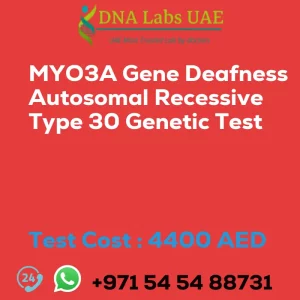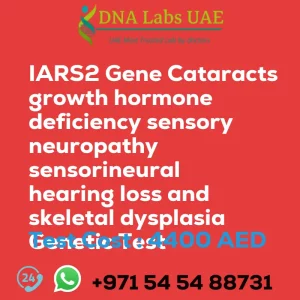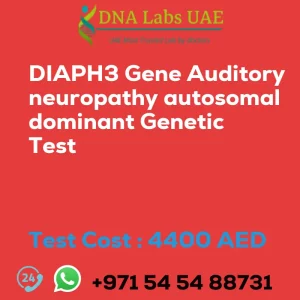POU4F3 Gene Deafness autosomal dominant type 52 Genetic Test
Components
- Price: 4400.0 AED
- Sample Condition: Blood or Extracted DNA or One drop Blood on FTA Card
- Report Delivery: 3 to 4 Weeks
- Method: NGS Technology
- Test Type: Ear Nose Throat Disorders
- Doctor: ENT Doctor
- Test Department: Genetics
Pre Test Information
Clinical History of Patient who is going for IARS2 Gene Cataracts, growth hormone deficiency, sensory neuropathy, sensorineural hearing loss, and skeletal dysplasia NGS Genetic DNA Test. A Genetic Counselling session to draw a pedigree chart of family members affected with IARS2 Gene Cataracts, growth hormone deficiency, sensory neuropathy, sensorineural hearing loss, and skeletal dysplasia NGS Genetic DNA Test gene IARS6.
Test Details
The POU4F3 gene is associated with a type of deafness called autosomal dominant type 52 (DFNA52). This type of deafness is inherited in an autosomal dominant pattern, which means that a person only needs to inherit one copy of the mutated gene from either parent to be affected. To confirm the presence of a mutation in the POU4F3 gene, a genetic test called Next-Generation Sequencing (NGS) can be performed. NGS is a high-throughput sequencing method that allows for the simultaneous analysis of multiple genes, including POU4F3, in a single test. This test can identify specific mutations or variations in the DNA sequence of the gene, which can help diagnose DFNA52.
Genetic testing for DFNA52 can be beneficial for individuals who have a family history of deafness or for those who are experiencing hearing loss themselves. It can provide a definitive diagnosis, help determine the inheritance pattern within a family, and guide treatment options and management strategies. It is important to consult with a healthcare professional or a genetic counselor to discuss the appropriateness of genetic testing, the potential risks and benefits, and the interpretation of the results. They can provide personalized guidance based on the individual’s specific situation and help make informed decisions regarding genetic testing.
| Test Name | POU4F3 Gene Deafness autosomal dominant type 52 Genetic Test |
|---|---|
| Components | |
| Price | 4400.0 AED |
| Sample Condition | Blood or Extracted DNA or One drop Blood on FTA Card |
| Report Delivery | 3 to 4 Weeks |
| Method | NGS Technology |
| Test type | Ear Nose Throat Disorders |
| Doctor | ENT Doctor |
| Test Department: | Genetics |
| Pre Test Information | Clinical History of Patient who is going for IARS2 Gene Cataracts, growth hormone deficiency, sensory neuropathy, sensorineural hearing loss, and skeletal dysplasia NGS Genetic DNA Test. A Genetic Counselling session to draw a pedigree chart of family members affected with IARS2 Gene Cataracts, growth hormone deficiency, sensory neuropathy, sensorineural hearing loss, and skeletal dysplasia NGS Genetic DNA Test gene IARS6 |
| Test Details |
The POU4F3 gene is associated with a type of deafness called autosomal dominant type 52 (DFNA52). This type of deafness is inherited in an autosomal dominant pattern, which means that a person only needs to inherit one copy of the mutated gene from either parent to be affected. To confirm the presence of a mutation in the POU4F3 gene, a genetic test called Next-Generation Sequencing (NGS) can be performed. NGS is a high-throughput sequencing method that allows for the simultaneous analysis of multiple genes, including POU4F3, in a single test. This test can identify specific mutations or variations in the DNA sequence of the gene, which can help diagnose DFNA52. Genetic testing for DFNA52 can be beneficial for individuals who have a family history of deafness or for those who are experiencing hearing loss themselves. It can provide a definitive diagnosis, help determine the inheritance pattern within a family, and guide treatment options and management strategies. It is important to consult with a healthcare professional or a genetic counselor to discuss the appropriateness of genetic testing, the potential risks and benefits, and the interpretation of the results. They can provide personalized guidance based on the individual’s specific situation and help make informed decisions regarding genetic testing. |








